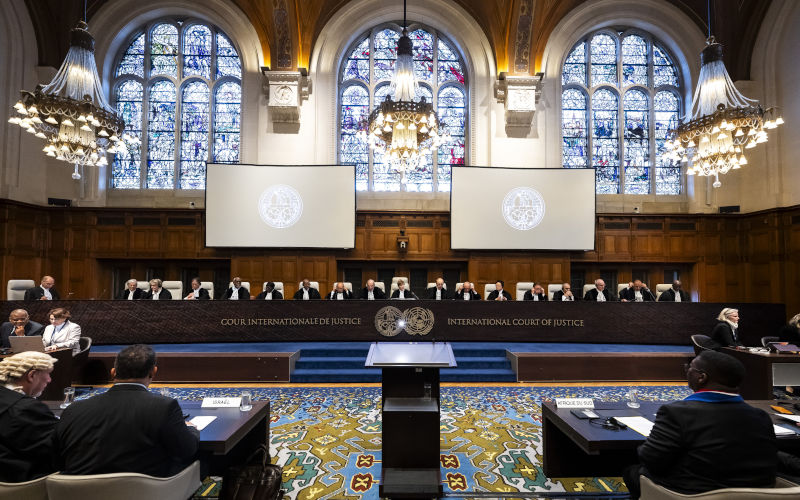Failure of the International Courts: when will we hear their determinations?
July 13, 2024
Readers of P&I may recall my earlier papers on the International Criminal Court of Justice (ICJ), and the International Criminal Court (ICC), and their recent forays into the Middle East quagmire. Some may have thought that this is a positive development, perhaps humanity is enlisting international law which will finally bring some common sense to the issue. Some might now be querying whether this optimism was misplaced, and asking, “When am I going to hear something of the Courts’ determinations?”.
Perhaps I should start with a recap.
First there was the reserving by the ICJ of its decision on the South African initiated proceedings asserting breach by Israel of the Genocide Convention. That decision was reserved on 26 January with provisional measures being ordered. The Court has re-assembled twice since then to consider refinement of the provisional orders, but ultimate judgment remains reserved. I don’t think that anyone would argue with the assertion that the provisional measures have done nothing, or at least not much, to restrain Israel’s conduct of its war in Gaza.
Then there was the hearing of the Advisory Opinion Case, whereby the ICJ undertook its duty to answer the request of the General Assembly, made on 30 December 2022, that it advise on “the legal consequences arising from the ongoing violation by Israel of the right of the Palestinian people to self-determination” (summarised), and legal consequences arising for all States and the UN. That hearing occurred from 19 to 26 February, on the last day of which judgment was reserved. The Court has not as yet advised when judgment might be handed down. This second matter was extensively canvassed in International law and Israel’s occupation: Understanding the ICJ advisory opinion case, March 7, 2024_._
The third matter is before the ICC. It arose from advice from the ICC’s Prosecutor, Karim Khan KC, that he considered that there was a case to answer against Prime Minister Bibi Netanyahu and Defence Minister Gallant, and that charges should be laid. Khan’s advice was back at the beginning of May. The decision as to whether a summons to appear or arrest warrants should be laid is taken by three of the Court’s 18 Judges and one might have thought that that decision would not take any significant time. We have in fact heard nothing form the ICC to this point in time. This third matter was canvassed in “Antisemitic hate crime”: US and Israel desperate to avoid ICC justice, May 11, 2024_._
My attention has been drawn to an article in The Guardian, of 8 July. The title is “ Labour expected to drop challenge to ICC over Netanyahu arrest warrant”. The article disclosed that the UK’s former government had made a submission to the ICC that it did not have jurisdiction over Israel’s nationals. The Sunak government’s request to lodge the challenge was apparently made on 19 June in secret but revealed a fortnight ago by the ICC, which had given the UK until 12 July to make its full submission. The Guardian considered that it was now highly unlikely that the Starmer government would pursue the claim.
This bit of news may well explain why the three-judge pretrial court has not yet made a determination on Khan’s application for a summons or arrest warrant to issue. It is not normally the case that the Prosecutor makes public any such application. It was not done when the Prosecutor make a similar application in respect of Vladimir Putin. The fact that it was done in this instance appears to have given to States opposed, the opportunity of seeking to prevent the matter proceeding. One must assume that the UK, as a party to the ICC, and not the US and Israel, which are not, made the application, and for that reason. That is not to say that behind the scenes the US is not bringing pressure to bear. That may explain why we have not heard from the Court. It is appropriate to note the passage in the US Congress on June 4 of the Illegitimate Court Counteraction Act. This legislation targets the ICC and seeks to protect US and Israeli actors, at the least, from its reach.
So that appears to be the current position. It is unfortunate that the World, so desperate for humanity to step up, and so hopeful that these international institutions might be the catalyst, appears to be being thwarted, either by a failure of the Courts to give proper precedence to the matter, or by a concerted effort by the culprits to ensure that they don’t.
I do hope that my earlier encouraged optimism was not wrongly aroused.
Postscript
Since writing the above, my attention has been drawn to a further article in The Guardian, this time, of 10 July. The article asserts that “ The US has been accused of putting pressure on the new Labour government not to drop a legal challenge mounted by Rishi Sunak’s administration over the international criminal court’s right to seek an arrest warrant against Benjamin Netanyahu for war crimes. … The ICC has given the new Labour government until 26 July to decide whether to pursue the legal challenge”.
The article also cites human rights lawyer Geoffrey Robertson as warning the new Labour government that to give in to US pressure would be “the first big moral mistake” of the government. Robertson adds: “The US is not a member of the ICC, and expects the UK to look after its interests there”.
There we have it!
